Raising understanding and awareness of Autism New Zealand has a knowledgeable, professional staff who work daily with children and adults with autism and their support networks. Their main role is ‘essentially empowering people living with autism’.
What is Autism and Aspergers Syndrome? Autism New Zealand’s definition is: “Children and adults who have an autism spectrum disorder look the same as other people, and due to the invisible nature of their disability it can be much harder to create awareness and understanding. Autism and Asperger syndrome still remain relatively unknown disabilities among the general population. Yet it is estimated that autism spectrum disorders (ASD) are approximately four times as common as cerebral palsy and 17 times as common as Down's syndrome. ASD affects 1 in 66 people, approximately 65,000 New Zealanders, which is equivalent to the entire region of Otago.” The following are some wonderful audio links around Autism which are well worth a listen: “Autism Research - Dr Javier Javier Virues-Ortega” on Radio New Zealand. https://www.ted.com/talks/ami_klin_a_new_way_to_diagnose_autism There's no known cause ... and no cure. Autism remains one of the most complex disorders for researchers to tackle. But what if we could see inside the brains of sufferers to see if therapies are actually reshaping them? That's what a New Zealand team plans to do. It's a world-first study combining the latest behavioural science with cutting-edge functional magnetic resonance imaging (fMRI) technology. “Karen Pierce and Eric Courchesne - Early Detection of Autism” on Radio New Zealand. https://www.rnz.co.nz/national/programmes/sunday/audio/201811139/karen-pierce-and-eric-courchesne-early-detection-of-autism Karen Pierce and Eric Courchesne are directors at the University of California's Autism Centre of Excellence. Dr Pierce specialises in the early detection and treatment of Autism Spectrum Disorder (ASD) in toddlers, and Dr Courchesne's research has proved that the abnormal brain development causing autism begins in the womb. Karen Pierce and Eric Courchesne are the keynote speakers at Autism New Zealand's national conference later this month. What's going on in the minds of children with neurological disorders https://www.radionz.co.nz/national/programmes/ninetonoon/audio/201817128/what's-going-on-in-the-minds-of-children-with-neurological-disorders Susan Haldane is the head of Mind Over Manner - an organisation which uses the power of theatre to help people understand what's going on in the minds of children with neurological disorders like ADHD and autism. ‘'Professor Russell Snell - the hunt for autism genes” on Radio New Zealand https://www.radionz.co.nz/national/programmes/saturday/audio/201837972/professor-russell-snell-the-hunt-for-autism-genes Kim Hill (RNZ) talks to Professor Russell Snell, a world-renowned geneticist based at the University of Auckland who has long studied human disease genes and variations in genes in general with a focus on the molecular genetics of disease, in particular neurodegenerative diseases like Parkinson's and Alzheimers. Down Syndrome and AgeingAdults with Down syndrome are living longer than ever before, now commonly reaching their 50’s 60’s and 70’s. For this reason it makes sense to learn all we can about the unexpected challenges that may accompany growing older. Many documents refer to adults with Down syndrome as ‘experiencing accelerated ageing'. What this means is, conditions usually seen in elderly adults (over 65) within the general population are being experienced by individuals with Down syndrome in their late 40's or 50's. The reason for this is not fully understood, but is believed to be largely related to the genes on chromosome 21 responsible for Down syndrome which are also associated with the ageing process. As we do not yet fully understand the ‘ageing’ process in adults with Down syndrome, predicting and preparing for this is challenging. Being aware of possible changes, and monitoring for early signs of these, will help with a proactive response. Below are a few common signs of ageing in adults with Down syndrome: Eyesight changes:
Diagnosis: Regular check ups with an Ophthalmologist can help with early diagnosis. Hearing changes:
Diagnosis: Routine ear examinations for wax and periodic screening with an audiologist is recommended. Undiagnosed vision and hearing problems are common and are frequently mistaken as stubbornness, confusion or disorientation. These can be greatly improved with glasses, hearing aids, removal of ear wax and environmental adaptions. Hypothyroidism: Common in adults with Down syndrome but frequently undetected. The thyroid gland is involved in various metabolic processes controlling how quickly the body uses energy, makes proteins and regulates hormones. Signs and symptoms can include:
Diagnosis and treatment: It can be easily detected by a blood test and controlled with medication. Obstructive Sleep Apnoea: Leading to poor quality sleep which is not restorative. It can also put a strain on the heart and lungs and cause high blood pressure. Early signs include: l snoring l gasping noises l daytime sleepiness l morning fatigue l excessive napping l fragmented sleep Later signs: l irritability l poor concentration l behaviour changes l impaired attention Diagnosis: Via a sleep study in a lab. Osteoarthritis: Many individuals with Down syndrome have hyper flexible joints. Over time these can lead to increased wear and tear on the large joints (hips, knees etc.) causing osteoarthritis. Those who are or have been overweight are at a greater risk. Arthritis is painful and it can lead to:
Treatment: Pain levels are often under reported so needs to be discussed with a GP or specialist if suspected. Suitable pain relief is essential. Osteoporosis: A thinning of bone mass leading to the risk of fracture. Adults with Down syndrome are at a higher risk for disease especially if there is:
Diagnosis: A bone density scan and can be treated with medication, exercise and diet. Atlantoaxial or Cervical spine (neck) instability: Instability between the first and second spinal bones directly below the base of the head, If instability is present and arthritis changes occur in the spine, there is increasing risk of damage to the spinal cord in that region. The bones of the neck are more vulnerable as adults with Down syndrome grow older. Symptoms include:
Diagnosis: A screening cervical spine x-ray is generally recommended at least once during adulthood. Coeliac disease: Where one’s body cannot digest gluten present in wheat products, causing damage to the lining of the intestine and preventing absorption of certain nutrients causing:
Diagnosis: Screening can be done via a blood test, but formal diagnosis requires a biopsy of the small intestine. Treatment: Dietary modification Alzheimer’s: A type of dementia that gradually destroys brain cells affecting:
Early onset Alzheimer’s disease is more common in adults with Down syndrome as they both share a genetic connection on chromosome 21. The risk of developing Alzheimer’s disease increases with age, although it is not inevitable that people with Down syndrome will get Alzheimer’s. It is helpful to have a good baseline of basic self-care skills, personal achievements, academic and employment milestones and other skills for comparison as changes are observed. Diagnosis: clinical judgment based on an accurate history. Reference: National Down Syndrome Society NDSS Aging and Down Syndrome Health and Well-being Guide. Disability - A Family Burden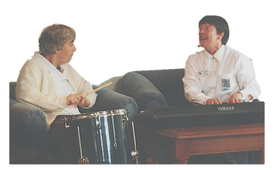 We hear stories of families who never get a day off, elderly parents who are still looking after their disabled adult children, and children with less obvious disabilities not receiving any support. Often families with disabled members feel isolated, alone and are unaware of the help they can receive. This is especially true for those with the least obvious disabilities. Compounding the problem health professionals are often unaware of the range of help available or assume families are linked into the services they require. 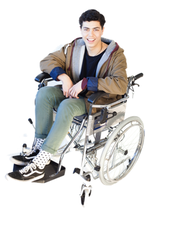 The trouble is the system for receiving government-funded supports is across a number of government ministries – Health, Education, and Welfare. These systems are hard to navigate, especially for stressed families and they don’t dovetail together easily. Also in the past 30 years government funded disability support services have focused on providing for a small group with the highest needs. No one would deny this group needs support, however this has left a large group who have been forgotten, many of whom would have benefited greatly from some assistance early in life, making them more independent and improving the quality of family life. There is help. If your child or young adult has not been in contact with the The Whatu Ora – Health NZ, the best place to start is the Needs Assessment and Coordination service (NASC), Whaikaha – Ministry of Disabled People funded service. You can refer yourself or a family member without having to go to a doctor. This will give you access to a number of Whaikaha funded and community services. The Ministry of Social Development has a range of benefits you may be able to access for yourself or your disabled family member. The Ministry of Education Special Education Services can be accessed for those at school. 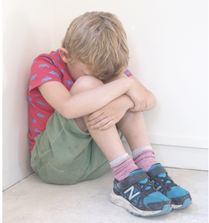 For your school aged child with special needs, it’s important to investigate the Ongoing Resources Scheme (ORS) and High Medical Needs Ministry of Education Funds as early as possible in their schooling. The sooner your child gets help the better. On the link below there are some handy links to government agencies, which may help relieve the burden of disability. There are many more organisations that can help, most of which are government funded. All the best navigating through this maze. http://www.therapyprofessionals.co.nz/uploads/4/9/5/2/49523375/handy_links_for_disability_services_.pdf Therapy for children with Special Needs All children learn through play. They acquire and practice physical, social, emotional, intellectual and sensory skills which are important in life. Those with special needs are no different, they too learn through play. To assist the development of children with special needs often play or games are used in a deliberate way to help the child achieve certain developmental milestones. Physio, Speech Language and Occupational Therapists can help. They will pinpoint what the child is able to do and assess whether they are progressing at the expected development rate. If a child is behind in their development the therapist may:
Toys and equipment can be expensive. For many families there are several ways you can reduce the cost, by buying second hand, sharing toys with other families, or joining a toy library. If you live in Christchurch. If you have a special needs child you can use the Special Needs Library for educational and therapeutic toys. The Special Needs Library assists parents and professionals to help those with special needs, supplies good play material and ideas to enrich the learning experiences, and employs a Play Advisor to assist parents to choose appropriate toys. They provide stimulating educational toys and equipment. Age is irrelevant. The needs of the clients are the most important factor. Those needs are from mild to severe and in any developmental area. The Special Needs Library offers you:
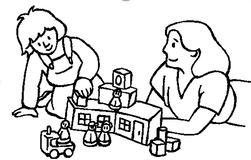 Catering for:
They welcome children and adults with long or short-term special needs, their families, teacher and therapists; groups and schools; or anyone with an interest in special needs. 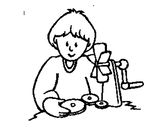 For example:
For those children with sensory issues - smell, visual, sound, touch, balance, posture, weight and pressure or issues with oral motor (muscles of eating), gross motor (large muscle movements), fine motor (finger skills) there is some help. The Southern Centre – multi sensory experience run out of Pioneer Recreation and Sports Centre is a great resource. Specialist sensory equipment can be brought from Sensory Corner in Auckland www.sensorycorner.co.nz. We would recommend you consult a therapist before using a sensory room or purchasing sensory equipment. The Southern Centre is a multi-sensory recreational environment for people of all ages and abilities. It uses innovative lighting and sound technology which allows participants to explore and create at the touch of a switch. It is a unique facility with the ability to cater for the needs of the individual and empowers the participant/s to choose their own environment, make changes and control their leisure time. The Southern Centre is located within Pioneer Recreation & Sport Centre and is a partnership that incorporates the Christchurch City Council and the Southern Centre Charitable Trust. If you have a child who is struggling, or they appear behind in their development compared to their peers, our friendly therapist may be able to help. Just contact Therapy Professionals Ltd Phone: (03) 377 5280 |
AuthorShonagh O'Hagan Archives
July 2024
|

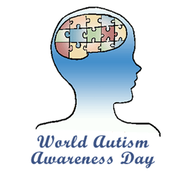
 RSS Feed
RSS Feed